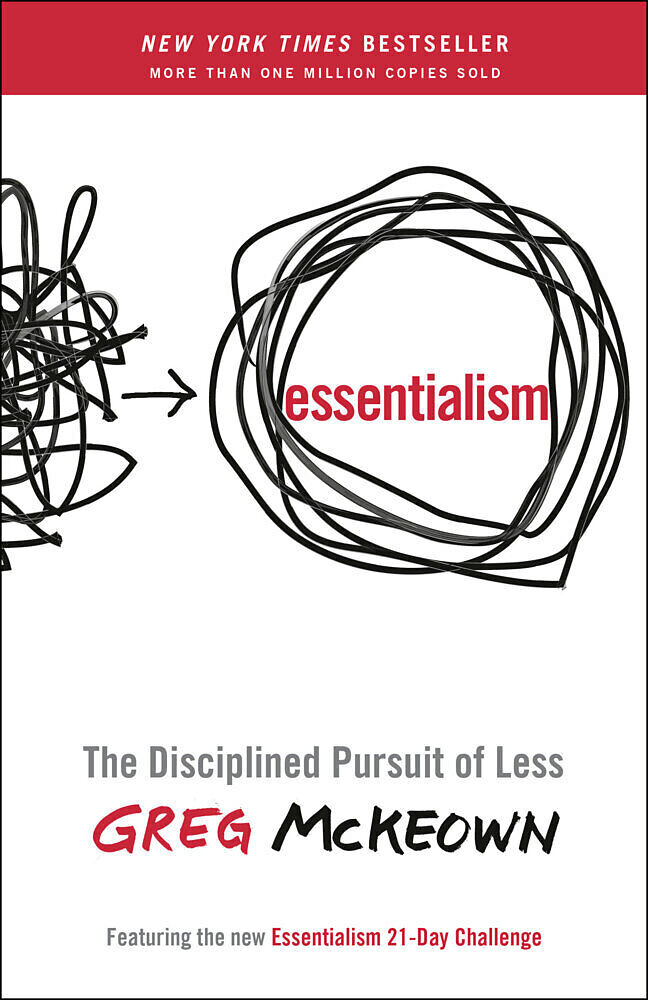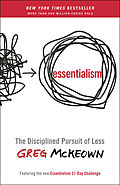

Essentialism
Beschreibung
THE LIFE-CHANGING NEW YORK TIMES BESTSELLER MORE THAN TWO MILLION COPIES SOLD Now in a 10th anniversary edition featuring a new introduction and bonus 21-day challenge. Essentialism holds the keys to solving one of the great puzzles of life: How can we do less...Format auswählen
- Poche format BCHF 15.40
Wird oft zusammen gekauft
Andere Kunden kauften auch
Beschreibung
THE LIFE-CHANGING NEW YORK TIMES BESTSELLER MORE THAN TWO MILLION COPIES SOLD Now in a 10th anniversary edition featuring a new introduction and bonus 21-day challenge.
**
Essentialism holds the keys to solving one of the great puzzles of life: How can we do less but accomplish more? Adam Grant, bestselling author of Think Again**
**
Essentialism isn t about getting more done in less time. It s about getting only the right things done.
**
Have you ever found yourself stretched too thin?
Are you often busy but not productive?
Do you feel like your time is constantly being hijacked?
**
If you answered yes to any of these, the way out is the Way of the Essentialist.**
Essentialism is more than a time-management technique. It is a systematic discipline for discerning what is absolutely essential, then eliminating everything that is not, so we can make the highest possible contribution toward the things that really matter.
By forcing us to apply more selective criteria for where to spend our precious time and energy, the disciplined pursuit of less empowers us to reclaim control of our own choices, instead of giving others the implicit permission to choose for us.
Essentialism is not one more thing to do. It s a whole new way of doing less, but better, in every area of our lives. Join the millions of people who have used Essentialism to change their outlook on the world.
Autorentext
Greg McKeown writes, teaches, and speaks around the world on the importance of living and leading as an Essentialist. He has spoken at companies including Apple, Google, Facebook, LinkedIn, Salesforce, Symantec, and Twitter and is among the most popular bloggers for the Harvard Business Review and LinkedIn Influencer’s group. He co-created the course, Designing Life, Essentially at Stanford University, was a collaborator of the Wall Street Journal bestseller Multipliers and serves as a Young Global Leader for the World Economic Forum. He holds an MBA from Stanford University.
Klappentext
Includes "New Essential 21-day challenge" at end of book, with daily challenges that match chapter headings.
Leseprobe
Chapter 1
The Essentialist
The wisdom of life consists in the elimination of non-essentials.
--Lin Yutang
Sam Elliot1 is a capable executive in Silicon Valley who found himself stretched too thin after his company was acquired by a larger, bureaucratic business.
1 Name has been changed.
He was in earnest about being a good citizen in his new role so he said yes to many requests without really thinking about it. But as a result he would spend the whole day rushing from one meeting and conference call to another trying to please everyone and get it all done. His stress went up as the quality of his work went down. It was like he was majoring in minor activities and as a result, his work became unsatisfying for him and frustrating for the people he was trying so hard to please.
In the midst of his frustration the company came to him and offered him an early retirement package. But he was in his early 50s and had no interest in completely retiring. He thought briefly about starting a consulting company doing what he was already doing. He even thought of selling his services back to his employer as a consultant. But none of these options seemed that appealing. So he went to speak with a mentor who gave him surprising advice: Stay, but do what you would as a consultant and nothing else. And don t tell anyone. In other words, his mentor was advising him to do only those things that he deemed essential--and ignore everything else that was asked of him.
The executive followed the advice! He made a daily commitment towards cutting out the red tape. He began saying no.
He was tentative at first. He would evaluate requests based on the timid criteria, Can I actually fulfill this request, given the time and resources I have? If the answer was no then he would refuse the request. He was pleasantly surprised to find that while people would at first look a little disappointed, they seemed to respect his honesty.
Encouraged by his small wins he pushed back a bit more. Now when a request would come in he would pause and evaluate the request against a tougher criteria: Is this the very most important thing I should be doing with my time and resources right now?
If he couldn t answer a definitive yes, then he would refuse the request. And once again to his delight, while his colleagues might initially seem disappointed, they soon began respecting him more for his refusal, not less.
Emboldened, he began to apply this selective criteria to everything, not just direct requests. In his past life he would always volunteer for presentations or assignments that came up last minute; now he found a way to not sign up for them. He used to be one of the first to jump in on an e mail trail, but now he just stepped back and let others jump in. He stopped attending conference calls that he only had a couple of minutes of interest in. He stopped sitting in on the weekly update call because he didn t need the information. He stopped attending meetings on his calendar if he didn t have a direct contribution to make. He explained to me, Just because I was invited didn t seem a good enough reason to attend.
It felt self-indulgent at first. But by being selective he bought himself space, and in that space he found creative freedom. He could concentrate his efforts one project at a time. He could plan thoroughly. He could anticipate roadblocks and start to remove obstacles. Instead of spinning his wheels trying to get everything done, he could get the right things done. His newfound commitment to doing only the things that were truly important--and eliminating everything else--restored the quality of his work. Instead of making just a millimeter of progress in a million directions he began to generate tremendous momentum towards accomplishing the things that were truly vital.
